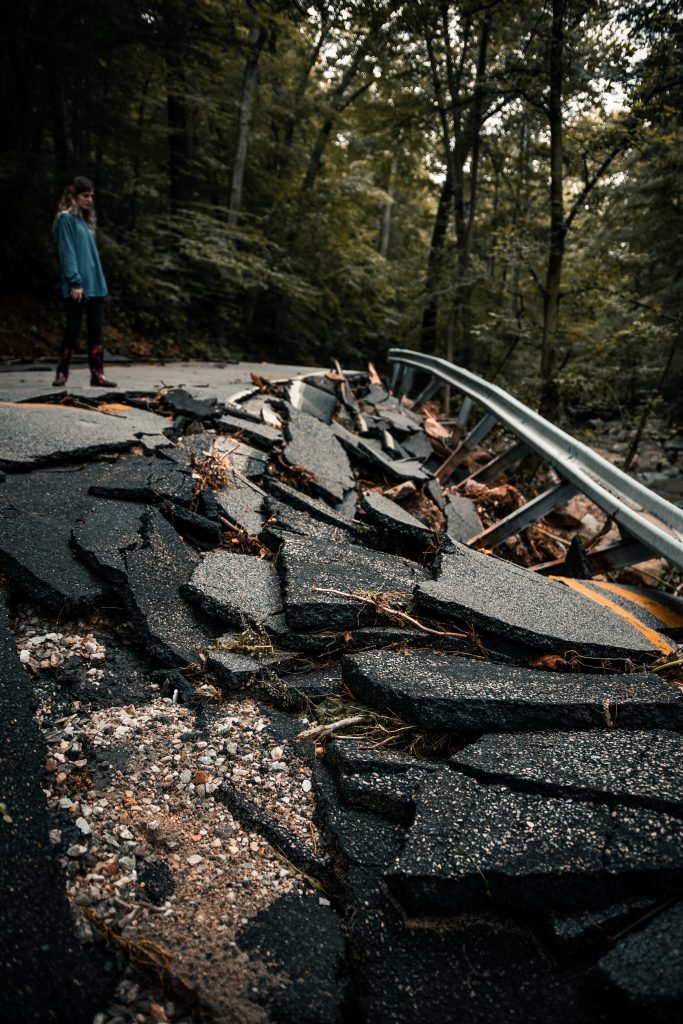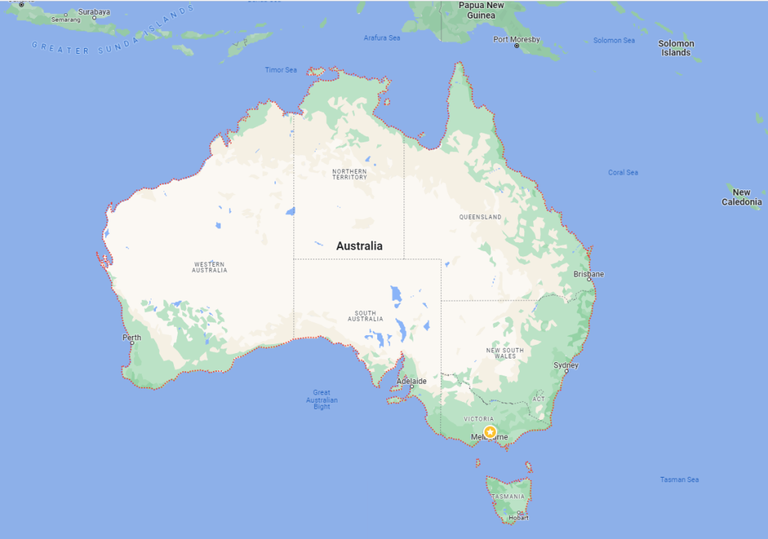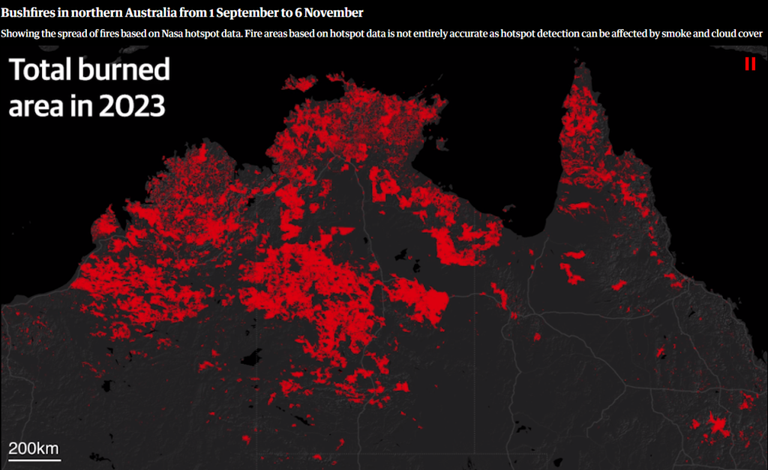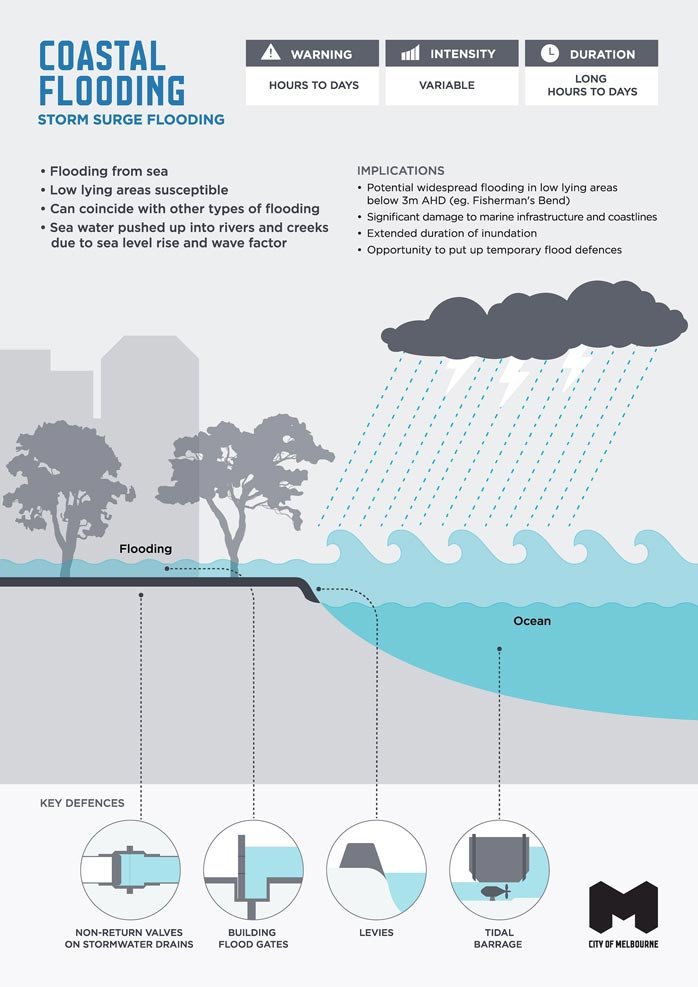
Welcome to my very wordy Collapse for Australia post!
Hi everyone!
So following on from my fairly depressing but hopefully informative post, I wanted to think about what collapse might look like in Australia. I want to think about how Australians might prepare, and if there are any lessons or thoughts for your own country that you might want to think about.
I was born in Australia and lived there for most of my life, and while I'm not there currently, I'm pretty sure I'll be moving back in the next year or so - not because it's at all better positioned to survive what's coming, but because it's where my people are. I'm intending to move to Melbourne, which is right where that little gold star is:
 Source
Source
Now, just to reiterate, when I say 'collapse', I'm not thinking of a single big event, nuclear war, zombie apocalypse or meteorite... I'm talking about the unraveling of our society due to a whole range of potential issues. I'm talking about each of us suffering hit after hit after hit until we no longer have the resources to feed ourselves or recover.
Apocalyptic seem to mostly have a big event (Fungus!) that drastically reduces the population and creates a strange new world for the survivors to move around in.... but there's always that hope they'll find a protected place with resources.
Unfortunately, I think the opposite will be true... we'll have too few resources to feed, heal and rebuild everyone and everything.
So, what problems do I foresee for Australia generally and Melbourne specifically?
For those that don't know... Australia is a massive country geographically, but an absolutely tiny country population-wise. It's got about 26 million people on a land about the size of the United States, which has 331 million people. That's about 7% the population. The problem is most of Australia is desert. Australia is pretty resource rich, which lots of iron ore, lithium, coal, cattle, wheat, Wiggles, etc.
Australia imports a lot. As fuel gets more and more expensive for shipping and flights, everything will get more expensive in Australia. I think it's more likely than not, that in a decade or two, air travel will be too expensive and too turbulent for most people to even consider.
1.) Heatwaves and drought
I'm sure this is absolutely no surprise.
Summer hasn't actually even started in Australia, but it's already lost an area the size of Spain in the last few months:
 Source
Source
The scary thing, Australia still has two weeks before summer even starts. Of course, Australia isn't alone here with Rio De Janeiro in Brazil copping temps of 58C earlier this week.
While bushfires are clearly very dangerous in Australia, the more major concern for me is the impact of heat waves on Australia's agriculture.
These are the predictions for next year:
Wheat -34%
Barley -30%
Canola -41%
This obviously affects Australians... and the Asian countries Australia normally exports to. These crop failures are all due to dryness, wheat struggles with temperatures above 27C.
The heat and dryness also affects livestock. Too many hot days and cows just start dropping dead. More hot days means its hard to grow the hay that they need (cows eat so much per day), it dries it out quicker and they won't get any nutrients from it if it's too dry, but the heat itself affects livestock themselves and their milk...
“Results showed that when temperatures exceeded 25°C, the fibre concentration of the plants increased while the concentration of soluble carbohydrates decreased. This reduces the quality of the feed grazed by cows during hot weather, resulting in likely flow-on effects on milk yield.”
Source
To cool cows down, farmers use water and sprinklers... but obviously hotter, drier temperatures mean that a lot less water is available, especially since lots of regions are already over-extracting their available ground water. Australian sheep can tolerate a lot more heat, but really start to struggle at about 38C. A decent heatwave could kill off a huge percentage of a regions livestock and there isn't a whole lot anyone can really do about it.
So... the increasing temperatures cause some major problems to Australia. Bushfires destroy towns that are expensive to rebuilt, heatwaves decrease food production of both crops (for people and feed for livestock) and from the livestock themselves.
Australia has spent the last 50 years or so consolidating its farms into absolutely huge wheat and barley farms, mainly for export (around 72% of production is exported), meaning that agriculture in Australia is not designed around regenerative farming for local populations, but about economies of scale for export. This set up is profitable, but its not resilient, so if there is a temperature or bug that wheat is susceptible to, then a huge percentage of Australian farming is affected.
2.) Power and Infrastructure
While Australia has some of the best residential solar roof adoption in the world (33% of Aussie homes!) there is still a lot of infrastructure run on coal and natural gas, often foreign owned - meaning the profits leave the country, but, more importantly, this infrastructure will get more expensive to run and maintain over time.
Australia is incredibly spread out, so long motorways, long transmission lines, long railway lines are all required and all very expensive to maintain.
I can definitely see scenarios where critical infrastructure is damaged by fires, floods or storms and State governments just cannot afford to repair or replace it... leaving whole regions of residents in trouble. Roads alone usually cost $5.5B to maintain, and that number is only going to get higher and higher as more extreme weather events hit. Australia typically ends up paying more for infrastructure maintenance than other countries.
Geographically, Melbourne is one of the largest cities (when you include the suburbs) in the world, which means there is so much infrastructure to update and maintain for not that many people (especially compared to cities like Tokyo or Jakarta). I imagine property rates will have to increase if extreme storms continue to damage huge sections of infrastructure.
3.) Flooding
The wild thing about flooding, is that it usually comes after a drought. The ground dries up, and gets really hard, and then instead of absorbing the rainfall it just slides on right by.
As temperatures heat up, the ground is obviously going to dry out, so we're going to see areas in Australia get flooded that have never been flooded before.
Australia is going to see more extreme storms, but, also, with the West Antarctica ice sheet already hitting its tipping point, estimates of 5.3 metres of ocean rise by 2100. It's unlikely that I'll live that long myself, but we could be looking at a metre rise every 15 years... which obviously means more flooding in Melbourne, Sydney, Adelaide, Perth and Hobart.
 Source
Source4.) Climate Refugees
I would imagine that as summer temperatures continue to rise, and bushfires and flooding gets worse, and as smaller towns are unable to pay for their infrastructure, there is going to be a lot more movement towards Melbourne.
I assume people from Queensland and Northern Territory may consider moving south over the next couple of decades. I also think it's really likely that people from countries like Indonesia and Philippines which has already seen 60cms of ocean rise already and may honestly become unlivable as the West Antarctica ice sheet melt speeds up. The population of these two countries is 273 million and 113 million (383 million combined), nearly 15 times the current population of Australia.
All those people have to go somewhere. It's definitely very doable to go from Indonesia, Philippines or Papua New Guinea by boat to Australia. North America and Europe are definitely going to have increased climate refugees from South America and Southern Europe, and Australia might need to take on huge numbers of refugees from sea level countries near the equator. Even if the sea level didn't rise dramatically, these countries might get too hot to grow crops to feed their populations.
5.) Future Pandemics
Australia is lucky in that it is a huge country surrounded by water so it can monitor it's ports of entry pretty well... but as the world heats up and ecosystems die off, we're going to see a lot more animals coming into the suburbs and cities to find food.
We're definitely going to see more zoonotic diseases hit the human populations, we've got bird flu getting super concerning in bird populations, Ebola, Marburg, Machupo, and Nipah all causing concern in human populations and this study predicting diseases will spill over 10 times greater and faster because of all the destruction of animal habitats.
With increased movement of climate refugees from Asia and across the Indian ocean from Africa, we might see more movement of diseases. Flooding also increases the risk of disease spread. It's something Australia is really going to have to work on systems and processes for.
6.) Housing
Australia already has a housing crisis, which will only get worse with fires, floods and refugees.
I really don't know how to think about housing during collapse. The supply of housing is extremely low in Australia... not enough houses are being built for the population, so right now there is a huge sense of urgency for people to try and get a house as soon as possible.
The reason I'm unsure is the damage costs that homeowners are going to have to pay out. Wildfires, floods, hail storms, trees falling, damage from heatwaves, etc etc. Insurance companies have already taken an absolute beating in Australia from natural disasters, and to be profitable they're going to have to start restricting what areas they operate in. We already see this in California and Florida. I honestly don't see how insurance companies survive the next couple of decades.
So... if homeowners can't get insurance (or insurance denies their claims) how do they recover from a flood? The finance resources to repair after flood damage is huge, and even if they can recover from one flood, it's not going to be too many years until the next one.
To me, this is a huge benefit to renting... the cost of building repairs is not your problem, and if an area floods, you can relatively easily move (in comparison to trying to find someone to buy your property that recently flooded)... but as a renter, you may end up paying higher rent as landlords try to pass on those costs. As a renter you don't have the opportunities to fortify your home against these dangers, or much of an opportunity to grow your own veggies when there is food shortages, or usually a workshop area to repair things (we're very much going to have to learn to repair our stuff - new things will get prohibitively expensive, if we can get them at all).
Living in an above-ground apartment in the city may protect you from wildfires, flood damage, lower your power costs, potentially be in walkable range for supplies and provide people nearby to help you in an emergency, but again, if your landlord doesn't fix your air conditioner and then you cop a couple of 40 degree days you might be in trouble.
The majority of Australian real estate is in coastal areas, but with West Antarctica already reaching its tipping point, we're looking at unavoidable sea rise. This means flooding of more areas during storms and a need to either continuously fortify or abandon towns or sections of cities - either way, massive infrastructure costs are in Australia's future.
What this could mean is that cities like Melbourne might see a further influx from people elsewhere in Australia as well as nearby countries like Indonesia and the Philippines .... adding to the housing strain.
It's really hard to decide what the right move is for me personally... and honestly, the housing stock is so low that my decision might have already been made for me.
While Australia does have an aging population like most developed countries, it also has established the infrastructure and support processes for immigration so I personally don't see a scenario where Melbourne specifically ends up with more supply than demand of housing.
Things I'm thinking about...
The hottest temperature recorded in Melbourne was 46.4 °C (115.5 °F) in 2009 and I imagine there is a good chance of breaking that this year or next during El Nino. I'm imagining in 15-20 years it'll be copping consecutive days of 50C, and with crumbling infrastructure people would likely be without power. Fuel costs will likely be high, too high for imports, crop yields will be low and so food will be expensive, fresh water will be scarce and people might generally be a lot sicker.
I imagine I'll rent for the next few years, but I'll be looking to buy property where I can grow some amount of my own food, harvest rainwater, have some sort of renewable power system plus batteries, a workshop space to repair things and insulate the place so that consecutive days of 50C without power won't kill us.
I'll be looking to grow robust, drought resistant crops but will need to plan for bushfires, extreme storms and floods. I'll definitely be choosing an area quite a bit inland from the coast, which, fortunately, is currently where the cheaper land is. Some fruit trees can take quite a few years before they'll yield a good amount of fruit, so you really have to start thinking ahead.
The next place I buy will likely be the last place I buy so I'll be making sure it's as resilient as can be.
Anyway... does any of this get you thinking? Will your country have similar problems?
Thanks for reading another, not super fun, Collapse for Australia post. I promise I'll do a more fun post next.

Posted from my blog with Exxp : https://lifebe.com.au/opinion/collapse-for-australia/
The specific challenges you outlined are certainly concerning. The impacts of climate change, such as heatwaves, droughts, floods, and rising sea levels, are already being felt in Australia, and they are only going to get worse. These extreme weather events will have a devastating impact on the country's infrastructure, economy, and population.
As you mentioned, the housing crisis in Australia is another major concern. The lack of affordable housing will only be exacerbated by the influx of climate refugees from other countries. This will put a strain on already stretched resources and lead to social unrest.
Yeah, the housing crisis is really bad... obviously more apartments and houses need to be built but that's a process that takes years. Australia also has a lot of immigration, which is awesome, and helps improve Australia's economy, but exacerbates the housing issues. So many Aussie building companies went bankrupt during the pandemic because materials just rose in price so quickly. It's really tough.
On a totally unrelated subject... wtf man? Maxed rebellion cards?? 😁 I couldn't understand half of what was going on! 🤣🤣🤣
NEITHER CAN I?!?!? I've got so many new cards and I don't understand any of them!
I've had 0 CL cards apart from the airdrops, and just struggled bigtime, so I pulled some DEC from the LPs and went bonkers. Time to make it back into Champs!
Ahahahah good luck! You'll be crushing it in no time! ;)
Sad to say, but thinking that all these are natural events, it's hard for me. Do not want to sound complotist or whatever, but weakening population is the best way to make it more 'condescendent' for the upcoming pressures.
Here in Italy, we should be like winter, and maybe tonight we are going to see for the first time temperatures lower than 5C.
There is much going on. We have to be focused now and in the coming futures
It's really hard to think about... it all feels almost impossible to consider.
The problem with the viewpoint of allowing a population to weaken is that:
1.) It's not very moral
2.) Children will be affected more than adults
3.) The richest and most polluting people will be safest, and carry on polluting
4.) You might lose entire professional skillsets, which makes society fall apart quicker
5.) Farms will likely be affected first, which affects the food supply for everyone
There is so many variables to consider, it's honestly overwhelming.
Almost impossible to consider, until someone starts opening the mind and connecting the dots.
I started being much suspicious about all that stuffs since 11 September 2001. I was just more than a kid, but there were too many "strange" things there
Australia's biggest risk of collapse is from major disruption to its supplies of petrol and diesel.
Australia has virtually no oil refining capacity left (despite being a substantail oil producer) and imports almost all its petrol and diesel from overseas, mainly Singapore. Refined products enter Australia at just a handful of ports.
If these supplies were disrupted, by war, terrorism or natural disaster, Australian cities would quickly collapse.
With no fuel for trucks (or the limited rail capacity) the country would grind to a halt and food supplies would quickly evaporate in cities, which are very far from the farms.
Yeah, I don't disagree at all. Australia keeps running almost exclusively on trucking transportation. I didn't realise the lack of oil refining capacity... I can see how it would be an easy function to offshore, but it's obviously not very resilient.
As oil gets more expensive to extract (ie, drills have to go deeper, etc) and both shipping and trucking transportation gets more expensive as a result, Australia is definitely going to feel the pain of that lack of oil refining capabilities.
I recon we are already seeing lots of supply chain issues, more increasing prices and inflation is on the move again. I just heard on the radio this morning that real estates values are back to all time highs. How long has it been since you been in Australia, you will probably see lots of changes. For me the most noticeable is working conditions which has been a real race to the bottom. Lots of casuals, labour hire and more salaried positions to get away from paying overtime. We may have had it too good for too long. Will be interesting to see how it all pans out. Though I am not that worried, might help us to develop and make more things here.
I am not sure about renting being a good idea . The under supply of rentals is driving that up as well, I think I would rather take my chances of trying to own something even without insurance.
!LUV
!LOL
!ALIVE
Yeah, I don't think I'd want to rent long term, purely because I'd want to be able to set up a place as I want it - essentially as resilient as possible - but I'm also assuming it'll take us some time to even find a property we can afford that ticks all the boxes, considering the absolute lack of supply in Melbourne. It's just hard given how expensive property in Melbourne is relative to our salaries.
I know I'm not alone in thinking Australia needs to put way more effort into affordable housing... if companies pay people less to try and be competitive in the international markets but then those workers can't afford to live anywhere close to those manufacturing plants, then the system breaks.
If Australia does end up with multiples of the population of climate refugees in the next few decades - it's going to need so much housing.
(1/5)@new.things sent you LUV 🙂
Made with LUV by crrdlx
You Are Alive so I just staked 0.1 $ALIVE to your account on behalf of @ new.things. (1/10)@aussieninja!
The tip has been paid for by the We Are Alive Tribe
 through the earnings on @alive.chat, feel free to swing by our daily chat any time you want, plus you can win Hive Power (2x 50 HP) and Alive Power (2x 500 AP) delegations (4 weeks), and Ecency Points (4x 50 EP), in our chat every day.
through the earnings on @alive.chat, feel free to swing by our daily chat any time you want, plus you can win Hive Power (2x 50 HP) and Alive Power (2x 500 AP) delegations (4 weeks), and Ecency Points (4x 50 EP), in our chat every day.
lolztoken.com
The first part was good.
Credit: reddit
$LOLZ on behalf of new.things
(2/10)
PLAY & EARN $DOOM
@aussieninja, I sent you anEvery country is suffering, things could be different, I hope Australia will cope with all the challenges they have and the people living in it will live a happy life.
Thank you. This has given me a lot to think about!
You're welcome! I know it's all pretty upsetting, especially for parents.
Unfortunately, I think a lot of the problems that Jo'burg is encountering at the moment (power constantly going out causing all sorts of long-term issues) might be an indicator of what other cities can expect in the coming decades.
In this way, when it happens, we also see that roads are damaged and many other things are damaged, but these are natural things, but there is nothing we can do, but people are suffering more and more. Even the beautiful places are destroyed and then it takes a long time to rebuild them until then the people there have to face problems like the earthquake in our country in 2005 and even till today those places are completely untouched. As they are, they could not be constructed.
Yeah, I honestly don't see how governments can continue to repair and rebuild as natural disasters start to be more regular and more powerful. I assume at some point governments will run out of money.
Exactly here in our country all the same things are happening, people come to government only to make their own money.
The world is held together by a string that keeps stretching.
The housing crisis has hit many countries, I don't see it getting better anytime soon.
Exactly. Even if all the arduous regulatory building restrictions and NIMBYism died away overnight, many countries would still have huge issues with supplying enough skilled labour and working through various supply chain issues. It's one of those problems that has been decades in the making (and could have absolutely been avoided) and will likely be decades in the solving.
It’s snowing outside my window now, it’s wonderful. The heat is very bad. Here sometimes the temperature in the summer rises to 30 degrees and it becomes uncomfortable for me to be outside for a long time. +45 and 50 degrees are not temperatures for living or indoor living (like in Dubai).
Absolutely... while people might be able to escape 45C days by going inside with air conditioner; wild animals, farm animals, plants and crops can't escape that heat.
Congratulations @aussieninja! You have completed the following achievement on the Hive blockchain And have been rewarded with New badge(s)
Your next target is to reach 17500 replies.
You can view your badges on your board and compare yourself to others in the Ranking
If you no longer want to receive notifications, reply to this comment with the word
STOPThat’s crazy and hard times for people living in Australia right now
I just hope some people are safe
One thing I have come to discover is it is not only found in Australia, I think it is generally among some countries round the world. The collapse most of the time is also asked by bad governance by the government to the people thereby making standard of living even worst for the citizen
Yay! 🤗
Your content has been boosted with Ecency Points
Use Ecency daily to boost your growth on platform!
Support Ecency
Vote for new Proposal
Delegate HP and earn more, by @lordshah.
So sad to this this situation
#hive #posh